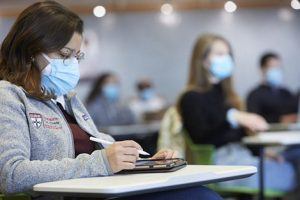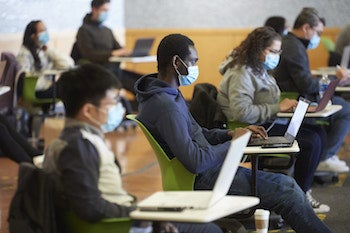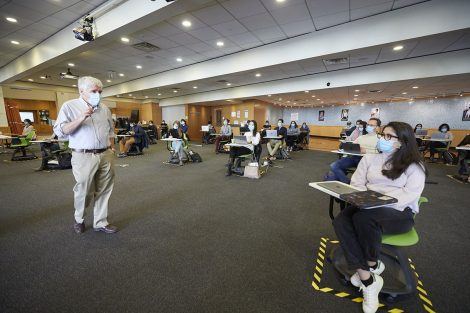April 6, 2021 – Since the beginning of spring semester, 35 international students have been gathering once a week in Harvard T.H. Chan School of Public Health’s Kresge cafeteria—masked and socially-distanced—to learn from faculty experts about topics ranging from U.S. health policy to cancer epidemiology to decision analysis.
The classes are part of a special hybrid program for first-year international students, who were facing a number of challenges with taking remote classes from thousands of miles away, according to Nancy Turnbull, senior associate dean for educational programs, and Sarah Stillman, Office of Education course manager. Turnbull and Stillman have helped lead the effort to make the program a reality in spite of the pandemic, which had forced all the School’s classes online since March 2020. The program was open to first-year international students who were eligible to get a U.S. visa.
The students are required to follow a slate of safety protocols, including masking and distancing both on- and off-campus and twice-per-week COVID-19 testing. They have a hefty required online courseload. And every Friday since January, they have been able to gather in person for classes created specifically for the new program. Each session is focused on a different current topic in public health, and each is taught by a different faculty member. Seated in chairs placed six feet apart, students often wear headsets that enable them to hear and speak with each other and with the professor without having to shout. “It makes them look like rock stars,” noted Stillman.

Apoorva Gomber, a physician from Delhi and an MPH student in global health, said she was thrilled to finally meet faculty members and fellow students in person after only seeing them in “little boxes” on Zoom during the fall. “It was so overwhelming, and so good, to be with other humans in the room,” she said. “Now I see what I was missing all these months.”
Margaret McConnell, associate professor of global health economics, who taught a Friday session titled “Behavioral Insights and Public Health Policy,” had a similar experience. “The energy of being in the classroom, seeing students’ faces to know when they’re excited and interested—that organic energy is a huge part of what I love about teaching,” she said. “There are a lot of things that are really good about Zoom teaching—in a lot of ways, it’s gone better than expected—but I was really struck by just how different it felt to be teaching in person and how great it was to actually see the students.”
“It was a wonderful, emotional experience to be back on campus with students,” said John Quackenbush, Henry Pickering Walcott Professor of Computational Biology and Bioinformatics and chair of the Department of Biostatistics, who taught a session on online resources for biomedical research. “It was particularly rewarding to meet two of the international students who are part of the Computational Biology and Quantitative Genetics program. They had met online during the first semester and not only jumped at the change to be in-person and in Boston, but they had become friends and roommates.” Quackenbush added that, about 90 minutes into his four-hour lecture, “the student questions became more compelling than anything I had prepared, so we settled into a discussion that touched on practical aspects of genomics in public health. My only regret is that we did not have more time.”
Solving the time zone problem
One of the main reasons for establishing the program was to ease students’ struggles around time zone differences. “Many of them were getting up in the middle of the night,” said Turnbull. “One student said he had basically turned himself into a vampire to attend school. He slept all day so that he could keep up with what was going on in class.”
Prior to the creation of the hybrid program, although students had the option to attend classes via recorded video at more convenient times, doing so meant that they couldn’t take part in discussions, noted Joseph Atarere, a physician from Nigeria earning an MPH in quantitative methods. “It wasn’t ideal,” he said.
Gomber noted that studying late at night “was affecting our productivity at work and our efforts in class.” In her case, she said the difficult schedule affected her diabetes, leading her to have unhealthy blood sugar levels. But things are better now that she’s in Boston. “I’m not exhausted any more, I’m more active and productive, and my blood sugar has improved,” she said. “Everything fell back into place.”
The hybrid program, which will continue into the summer, also solves another problem for these international students—it will enable them, when they finish their studies at Harvard Chan School, to meet federal requirements for participating in a program called Optional Practical Training (OPT), through which students can stay in the U.S. after they graduate to get more real-world public health experience.
Some international students had also faced the possibility of losing external funding if they weren’t able to study in residence at the School, Turnbull noted.
Quick turnaround
After hearing last fall from a number of students about their difficulties, a Harvard Chan team from student services, education, operations, and information technology worked with colleagues from across the University, including the Harvard International Office, the Office of the General Counsel, Environmental Health & Safety, and University Health Services, to get the program off the ground. Faculty members from almost every department volunteered to teach the in-person Friday classes, Stillman noted.
“We are incredibly grateful to the faculty and staff who made this possible,” she said. “They’ve done so because they recognize the importance of this program.”
 Gomber noted that Turnbull and Stillman “helped us in feeling at home from the beginning.” They provided information about places to see in the Boston area, where to go for food and supplies—and even sweets, said Gomber. “One surprising thing that I loved was that Nancy baked cookies for us,” she said. “She put them in very nice single packages for every student in the class. After all of our struggles to come here, it was really memorable.”
Gomber noted that Turnbull and Stillman “helped us in feeling at home from the beginning.” They provided information about places to see in the Boston area, where to go for food and supplies—and even sweets, said Gomber. “One surprising thing that I loved was that Nancy baked cookies for us,” she said. “She put them in very nice single packages for every student in the class. After all of our struggles to come here, it was really memorable.”
photos: Kent Dayton
